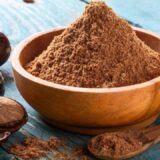Makhana: Health Benefits, Nutritional Value and Side Effects
Fox nut, also known as lotus seed or Makhana, holds a special place in both Ayurveda and Traditional Chinese Medicine (TCM). In these ancient systems of healing, it is not just considered a nutritious food but also a potent medicine. In Ayurveda, Makhana is particularly valued for its ability to balance the body’s internal systems.
It is often prescribed to treat gastritis, where it helps soothe inflammation in the stomach lining. Additionally, Makhana is known for its effectiveness in managing bleeding disorders, such as nasal bleeding, due to its astringent properties. The seeds of the lotus plant are packed with essential nutrients, making them a valuable addition to the diet.
They are rich in protein, fiber, and essential minerals like calcium, magnesium, and potassium, which contribute to overall health and well-being. In Sanskrit, this versatile seed is referred to as “Makhana” or “Ankhalodya,” names that highlight its significance in traditional Indian medicine and culture.
Whether used as a food ingredient in various recipes or as a remedy in Ayurvedic treatments, Makhana continues to be celebrated for its numerous health benefits and its role in maintaining balance within the body.
Ayurvedic Properties of Makhana
Guna (Qualities):
- Guru (Heaviness): Makhana is considered heavy in nature, which means it has a substantial effect on the body and provides a feeling of fullness and sustenance.
- Snigdha (Unctuousness): It is also described as unctuous, meaning it has a moisturizing and soothing quality that helps in maintaining body fluids and supports overall nourishment.
Rasa (Taste):
- Madhura (Sweet): Makhana has a predominantly sweet taste, which is beneficial for balancing the body’s energies and providing nourishment.
- Kashaya (Astringent): It also has a slightly astringent taste, which helps in toning tissues and can contribute to its beneficial effects on digestion.
Tikta (Bitter): It has a hint of bitterness, which can aid in detoxification and balance various bodily functions.
Vipaka (Post-Digestive Effect):
- Madhura (Sweet): After digestion, makhana undergoes a transformation to a sweet taste, which indicates its ability to provide a sustained source of energy and support overall well-being.
Veerya (Potency):
- Sheeta (Cold Potency): Makhana has a cooling effect on the body, which helps in balancing excess heat and calming inflammation. It is especially useful for conditions associated with excess Pitta (heat).
Effect on Tridosha:
- Balances Vata and Pitta Dosha: Makhana is known to pacify both Vata and Pitta Doshas. Its heavy, unctuous, and cooling qualities help stabilize these doshas, making it beneficial for conditions related to Vata and Pitta imbalances, such as digestive disorders and inflammation.
Summary: Makhana (fox nut) is a highly regarded medicinal food in Ayurveda due to its balanced qualities. Its heavy and unctuous nature, combined with its sweet, astringent, and slightly bitter tastes, makes it effective in nourishing the body, balancing doshas, and providing a cooling effect.
Its ability to balance Vata and Pitta doshas and its post-digestive sweet effect makes it a valuable component of a balanced diet and therapeutic regimen.
Vernacular Names
Vernacular names for fox nut (Makhana) in various languages.
- English: Fox Nut
- Hindi: Makhana
- Punjabi: Jaivar
- Telugu: Melluni Padmamu
- Bengali: Makhana
- Marathi: Mane
- Gujarati: Makhana
- Urdu: Kanta Padm
- Manipuri: Thangjing
- Japanese: Onibas, Onibasu
- Assamese: Nikori
- Chinese: Qiàn Shí
Sanskrit Synonyms
Sanskrit synonyms for fox nut (Makhana) along with their meanings:
- Makhanna: This term is used in the context of Hindu spiritual practices such as Yajna (sacrificial rituals) and Homa (fire offerings). The term “Makhanna” highlights its ceremonial and ritualistic significance.
- Ankhalodya: This name translates to “found in ponds.” It reflects the plant’s natural habitat, which is typically aquatic or semi-aquatic environments like ponds and water bodies.
- Padma Beejabha: Meaning “seed resembling those of the lotus,” this term emphasizes the visual similarity between makhana seeds and lotus seeds, which are both used in various traditional practices.
- Paaneeyaphala: This term translates to “fruit found in ponds.” It denotes the aquatic nature of the plant, indicating that the seeds (or fruits) are found growing in water.
These synonyms reflect the traditional and descriptive aspects of makhana in Sanskrit, capturing its role in rituals, its habitat, and its resemblance to the lotus seed.
Top 10 Health Benefits Of Consuming Makhana (Fox Nuts)
Makhana, or fox nuts, is a crunchy, nutrient-packed superfood that has been enjoyed for centuries. Beyond its delicious taste, this humble seed offers a treasure trove of health benefits.
From aiding weight management to boosting heart health, makhana is a versatile addition to your diet. Let’s explore the incredible ways this superfood can enhance your well-being.
1. Enhance Your Weight Loss
Makhana seeds are rich in protein and fiber, two key nutrients that support weight loss. Protein helps regulate appetite by reducing food cravings, while fiber moves slowly through the digestive tract, promoting a feeling of fullness throughout the day.
Studies suggest that a higher intake of fiber is associated with reduced belly fat and weight loss. While specific research on makhana’s impact on weight loss is limited, its fiber and protein content makes it a supportive food for weight management.
2. Maintains the Digestive System
Makhana’s high fiber content aids digestion and helps maintain regular bowel movements. For those struggling with constipation or hard stools, incorporating makhana into your diet can improve digestive function and provide relief.
Its natural fiber helps regulate bowel movements, making it an effective addition to support overall digestive health and alleviate common gastrointestinal issues.
3. Reduces the Aging Process
Makhana contains flavonoids, which are potent antioxidants. These compounds combat free radicals, slowing down the aging process and preventing signs such as wrinkles, fine lines, and premature greying of hair. Regular consumption of makhana may help reduce visible signs of aging and support overall skin health.
4. Keep Your Heart Healthy
Makhana is rich in phytonutrients, including alkaloids, saponins, and gallic acid, which contribute to cardiovascular health.
Its high magnesium content acts as a channel blocker, improving blood flow and reducing the risk of heart disease. Eating a handful of makhana daily can help meet your magnesium needs and support heart health.
5. Overcomes Infertility
Makhana supports reproductive health by maintaining hydration and moisture in the body’s secretions. It is thought to enhance both the quantity and quality of sperm, potentially improving fertility.
By incorporating Makhana into your diet, you may benefit from its effects on reproductive health and support overall fertility.
6. Avoid Inflammation
Makhana contains flavonoids with anti-inflammatory properties that help reduce chronic inflammation and support tissue regeneration.
This makes it beneficial for managing conditions related to inflammation and bacterial infections. By incorporating Makhana into your diet, you can leverage its natural compounds to help combat inflammation and promote overall health.
7. Maintain Normal Blood Pressure
Makhana, rich in potassium and low in sodium, is excellent for maintaining normal blood pressure. Its high potassium content helps regulate systolic blood pressure levels and supports overall cardiovascular health.
Including Makhana in your diet can contribute to better blood pressure management and promote a healthier heart.
8. Stabilizes Blood Sugar Levels
Research indicates that makhana may aid in blood sugar control. Animal studies have shown that makhana extract can improve blood sugar regulation and enhance the activity of antioxidant enzymes.
Research Note: While these studies are promising, further research in humans is needed to confirm makhana’s effects on blood sugar levels when consumed in typical dietary amounts.
9. Aids People Suffering from Arthritis
Makhana, rich in calcium, supports bone health and can be beneficial for those suffering from arthritis. Its high calcium content helps strengthen bones and may aid in preventing conditions such as arthritis and osteoporosis.
Ensuring adequate calcium intake is essential for maintaining strong bones and reducing the risk of fractures, making Makhana a valuable addition to a bone-health-focused diet.
10. Improves Kidney Health
Makhana’s astringent properties and low sodium content contribute to better kidney health. It helps control blood pressure and can aid in managing issues such as frequent urination and kidney function.
Incorporating makhana into your diet can support kidney health and improve overall renal function. Incorporating makhana into your diet can provide a range of health benefits, from weight management and digestive support to cardiovascular health and improved kidney function.
Ayurvedic Health Benefits Makhana
Vrushya (Aphrodisiac)
- Makhana is known for its aphrodisiac properties. It enhances sexual vitality and vigor, which can improve libido and overall sexual health.
Garbha Samsthapaka (Ensures Safe Pregnancy)
- Makhana is traditionally used to support a healthy pregnancy. It is believed to nourish the body and ensure safe delivery by maintaining proper health and strength during pregnancy.
Balya (Improves Strength and Immunity)
- Makhana strengthens the body and boosts immunity. Its nutrient profile supports overall health and can enhance physical strength and resilience.
Grahi (Absorbent)
- Makhana’s absorbent properties make it useful in managing diarrhea and irritable bowel syndrome (IBS). It helps absorb excess fluid in the intestines, reducing loose stools and improving digestive health.
Kinchit Marutakrut (Slightly Increases Vata Dosha)
- Makhana can slightly increase Vata dosha due to its dry and light nature. It is advisable to consume it in moderation and balance with other foods that pacify Vata.
Snigdha (Unctuous, Oily)
- Makhana has a slightly unctuous quality, meaning it has moisturizing and soothing properties. This can help balance dryness in the body and support overall nourishment.
Summary of Benefits:
- Constipation Management: Makhana’s astringent nature can help manage bowel movements but requires careful consumption.
- Sexual Health: Its aphrodisiac properties enhance sexual vigor and performance.
- Pregnancy Support: Nourishes the body and supports a healthy pregnancy.
- Strength & Immunity: Contributes to improved physical strength and immune function.
- Digestive Health: Useful for controlling diarrhea and supporting digestive health.
- Vata Dosha Balance: Slightly increases Vata, so it should be balanced with other Vata-pacifying foods.
- Moisturizing Properties: Provides a soothing effect on the body.
Incorporating makhana into your diet can offer a range of health benefits, but it’s essential to consume it in appropriate amounts and in combination with other foods that balance its effects, especially if you have specific health concerns or dosha imbalances.
Different Ways to Use Makhana
There are various ways to use makhana (fox nuts) in your diet, each method offering different textures and flavors:
1. Fresh Makhana
Usage:
- Raw Consumption: Take 1-2 handfuls of makhana as a healthy snack or as part of your meal.
- In Salads: Add a few raw makhanas to your salads for an extra crunch and nutritional boost.
2. Roasted Makhana
Preparation:
- Heat Oil: Heat a small amount of oil (or ghee) in a pan over high flame.
- Simmer: Once the oil is hot, reduce the flame to a simmer.
- Roast: Add the makhana to the pan and roast, stirring frequently, until they become crunchy and slightly golden.
- Seasoning: Season with salt, black pepper powder, and chaat masala if desired.
- Consumption: Eat 2-3 handfuls per day as a snack, or sprinkle over salads for added flavor and crunch.
3. Makhana Powder (Makhana Flour)
Preparation:
- Grind: Take 2-3 cups of makhana and grind them into a fine powder using a grinder or food processor.
- Mixing: In a bowl, take ½ cup of the makhana powder.
- Add Water: Gradually add hot water, mixing continuously with a spoon or whisk until smooth and free of lumps.
- Add Ghee: Incorporate ghee into the mixture and mix well.
- Cool & Sweeten: Allow the mixture to cool. You can add honey to taste before consuming.
Usage Tips:
- Snack Option: Roasted makhana is a nutritious and crunchy alternative to conventional snacks and can be enjoyed at any time of the day.
- Meal Addition: Raw makhana can be a great addition to salads, providing extra texture and health benefits.
- Smoothies & Desserts: Makhana powder can be used to thicken smoothies or added to desserts for a unique flavor and nutritional boost.
- Digestive Aid: Makhana powder mixed with water can be soothing and beneficial for digestive issues.
Note: Adjust the quantity and preparation methods based on personal preference and dietary requirements.
Medicinal Uses of Makhana
1. Male Sexual Dysfunction
Male sexual dysfunction can manifest as a loss of libido, low erection time, or premature ejaculation. Makhana is known for its aphrodisiac (Vajikarna) properties, which enhance the quality and quantity of semen, thereby supporting male sexual health.
Usage:
- Quantity: Take 1-2 handfuls of makhana or adjust as needed.
- Preparation: Shallow fry the makhana in 1/2 to 1 teaspoon of ghee.
- Consumption: Consume with milk or add it to your food.
2. Diarrhea (Atisar)
Diarrhea, or Atisar in Ayurveda, is often caused by improper diet, impure water, toxins, mental stress, and weak digestive fire (Agnimandya). Makhana’s absorbent (Grahi) properties help in managing diarrhea by aiding nutrient absorption and controlling loose stools.
Usage:
- Quantity: Take 1-2 handfuls of makhana or as required.
- Preparation: Shallow fry the makhana in 1/2 to 1 teaspoon of ghee.
- Consumption: Have light food to soothe the digestive system.
3. Insomnia (Anidra)
- Insomnia or Anidra is often linked with an aggravated Vata dosha. Makhana helps in balancing Vata and has a heavy (Guru) nature, which can aid in alleviating sleep disturbances.
Usage:
- Quantity: Take 1-2 handfuls of makhana or as needed.
- Preparation: Shallow fry the makhana in 1/2 to 1 teaspoon of ghee.
- Consumption: Consume with milk at night to promote better sleep.
4. Osteoarthritis (Sandhivata)
- Osteoarthritis, known as Sandhivata in Ayurveda, is characterized by Vata dosha aggravation, leading to joint pain, swelling, and immobility. Makhana’s Vata balancing properties can provide relief from these symptoms.
Usage:
- Quantity: Take 1-2 handfuls of makhana or as needed.
- Preparation: Shallow fry the makhana in 1/2 to 1 teaspoon of ghee.
- Consumption: Consume with milk or add to your meals to help manage osteoarthritis symptoms.
Tips for Preparation and Consumption:
- Shallow Frying: Shallow frying in ghee enhances the flavor and nutritional benefits of makhana. The ghee also helps in better absorption of nutrients.
- Consuming with Milk: Combining makhana with milk at night can enhance its effectiveness for sleep-related issues and provide additional nourishment.
- Adding to Food: Makhana can be incorporated into various dishes, making it versatile for addressing multiple health concerns.
Note: While makhana offers potential health benefits, it’s important to consult with a healthcare provider before using it as a remedy, especially if you have underlying health conditions or are taking other medications.
Makhana, or fox nuts, are a crunchy, light snack packed with protein and fiber. Low in calories and rich in nutrients, they make a perfect guilt-free treat. Enjoy them roasted, flavored, or as an ingredient in your favorite dishes. Discover the incredible benefits of this superfood today!
Resources:
- Red-Skin Extracts of Lotus Seeds Alleviate High-Fat-Diet Induced Obesity via Regulating Lipoprotein Lipase Activity(1)
- Lotus seeds (Nelumbinis semen) as an emerging therapeutic seed: A comprehensive review(2)
- A comprehensive review on lotus seeds (Nelumbo nucifera Gaertn.): Nutritional composition, health-related bioactive properties, and industrial applications(3)
- Anti-obesity and hypolipidaemic effects of Nelumbo nucifera seed ethanol extract in human pre-adipocytes and rats fed a high-fat diet(4)

























